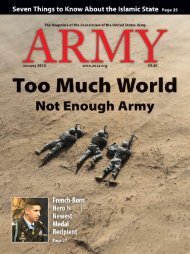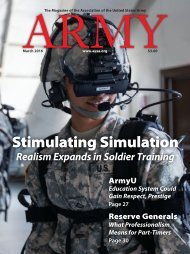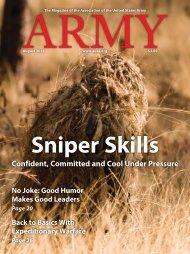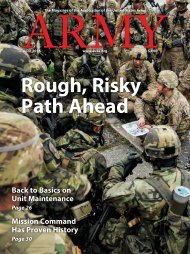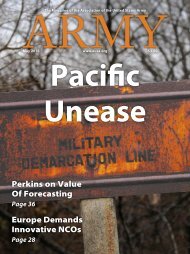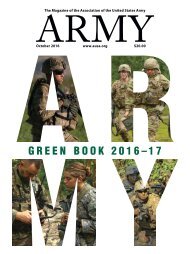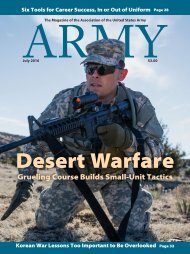Army - Kicking Tires On Jltv
Create successful ePaper yourself
Turn your PDF publications into a flip-book with our unique Google optimized e-Paper software.
Seven Questions<br />
For Female Veterans in Texas, There’s H.O.P.E.<br />
Retired <strong>Army</strong> Lt. Col. Hope Jackson is the founder of H.O.P.E.<br />
Institute, a Texas-based nonprofit organization dedicated to helping<br />
homeless female veterans become self-sufficient and independent by<br />
offering housing, education and other services. The acronym stands<br />
for healing, optimizing, perfecting and empowering.<br />
1. Why did you create H.O.P.E. Institute?<br />
I was about 20 years into my career when I got to Fort Bliss in<br />
2006. I was ready to retire here. It struck<br />
my spirit—that here we are next to one of<br />
the largest and fastest-growing military<br />
installations in the world, and there’s<br />
nothing for [homeless] female veterans. I<br />
purchased a home to house homeless female<br />
veterans. That’s how H.O.P.E. Institute<br />
was born. We received 501(c)(3)<br />
status in June 2012.<br />
2. What is H.O.P.E. Institute’s mission?<br />
Our focus is homeless female veterans.<br />
Of the nearly 22 million veterans in this<br />
country, around 2.1 million are women.<br />
Of that population, almost 5 percent are<br />
homeless. What you have to keep in mind<br />
is, that only accounts for the female veterans<br />
who identify as homeless, because<br />
there are still some out there who we don’t<br />
know about yet.<br />
Something’s wrong with that picture.<br />
Retired Lt. Col. Hope Jackson<br />
That could have been any of us given different<br />
circumstances, maybe different<br />
choices, maybe different exposures. So the focus today is to<br />
serve those who gave of themselves so selflessly and now can’t<br />
find a place to call home. Those numbers, this situation, isn’t<br />
going to go away because women are still raising their right<br />
hand to serve and defend.<br />
3. What services does the institute provide?<br />
Every veteran’s needs will be different. When a woman<br />
comes in, she and I will sit down and put together what I call<br />
an individual development plan, which is really her road map<br />
for success. I want the resident to identify what she defines as<br />
success. When she tells me what she wants to do in the next<br />
phase of her life, then we will put together a road map to get<br />
her from where she is to where she deserves to be. It is a selfgoverning<br />
program.<br />
The first 30 days is an acclimation period. There are not going<br />
to be any passes. We are going to go through everything in<br />
terms of their finances, to see if they’re getting all of the benefits<br />
that they are entitled to. We have a job placement program in<br />
place. We’re partners with an organization that has an online<br />
U.S. <strong>Army</strong>/Sgt. Adam Garlington<br />
platform for higher education that caters to the military. Any<br />
woman coming into the program will get her education through<br />
this organization for free.<br />
<strong>On</strong>e thing that is critically important to understand is that<br />
this isn’t a place where these ladies can come in, go back out,<br />
and continue along the same path that they were on before they<br />
came in. This is a place that is about changing lives. They just<br />
lack the resources, the mentorship and the leadership to help<br />
them make that transition.<br />
4. Are there specific qualifications for<br />
these services?<br />
Yes. First, they must be a veteran. In order<br />
to prove that, I just need a DD-214<br />
[certificate of release or discharge from active<br />
duty] and a VA identification card. It<br />
doesn’t matter their discharge status because<br />
this is a no-judgment zone. We take<br />
you how you come. If you are willing to<br />
work hard to get back on your feet, to have<br />
a life you’ve chosen and your version of the<br />
American dream, we’re here to help.<br />
5. How is the institute funded?<br />
I give presentations around the city to<br />
social and civic organizations and as a result,<br />
many of those groups make donations<br />
to the institute. Citizens in the community<br />
sometimes make small donations, and the<br />
rest comes from me.<br />
6. What does H.O.P.E. Institute need<br />
to continue?<br />
Funding, funding, funding is what we need to run a facility like<br />
this. This is a home, just like you and I live in. My military training<br />
has taught me that the smaller the group, the larger the<br />
chance for success. This is a four-bedroom home that has been<br />
completely renovated. Each room houses two women, so we are<br />
working with groups of six to eight women. It takes resources to<br />
provide food, keep the lights on, pay the water bill. We’re looking<br />
at anywhere from $9,000 to $10,000 a month to keep the house<br />
operational. So that’s how people can help. They can go to our<br />
website at www.theinstituteofhope.org and make donations.<br />
7. What do you hope the institute will accomplish in the future?<br />
The flagpole is here in El Paso, Texas, but the needs of female<br />
veterans are expanding around the entire country. I see<br />
H.O.P.E. Institute being a household name over the next five to<br />
10 years. Anywhere that there’s a large population of female veterans<br />
combined with a military installation, H.O.P.E. Institute<br />
will have a footprint. We are here to change lives, one duty station<br />
at a time.<br />
—Jennifer Benitz<br />
February 2016 ■ ARMY 5




